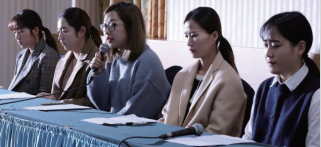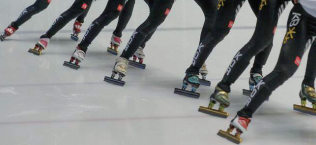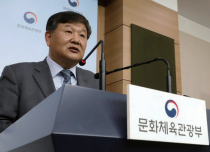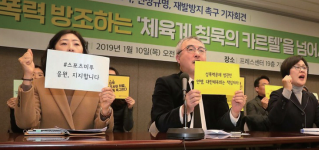Korea’s sports world has been plagued by corruption and violence for a long time. Moreover, it is going through an increase in criticism because of the recent confession of short track Olympic gold medalist Shim Suk-hee that she has been the victim of physical harm and sexual assault by her coach Cho Jae-Beom. There are criticisms towards the coach himself of course, but criticism is also heading towards a secretive group referred to as the “silent cartel” within the Korean sports world that has silenced and tolerated various irregularities and violence. Accordingly, the Sungkyun Times (SKT) finds out more about the story behind this silent cartel in the athletic world and discusses possible countermeasures.
Sports Organizations and the Silent Cartel
Definition of the Silent Cartel
Cartel originally meant a written treaty signed between hostile nations, groups, or people. Nowadays, the word usually refers to a form of a joint business union implemented to increase monopoly profits among companies in the same industry. The word “cartel” used in the term “silent cartel”, however, is more like the word “cartel” used in drug cartels, which refers to groups that are vertical and closed. The concept of a silent cartel in sports has recently emerged in the Korean media along with the spread of the #MeToo movement in the sports industry. The concept of a cartel in relation to sports is the closed and vertical structure within the sports industry or sports organization that systematically covers up events that may negatively affect an organization, such as sexual violence or assault.
The Silent Cartel, a Wide Spread Disease in Korean Sports
Various sports organizations have been silent about a variety of facts that may be detrimental to their reputations. The spectrum of facts that athletes and officials have been forced to be silent about ranges from violence or sexual assault to corruption charges and interference in the selection of players. The term “silent cartel”, however, means that most of these cases have literally remained silent. Thus, there are relatively few cases that have actually been disclosed to the public and the media. One of the very few but most famous cases of the silent cartel that has been exposed to the public is the case of Cho Joong-yeon, who was a former chairman of the Korea Football Association (KFA). After his term as a chairman of the KFA, he was hired by the KFA as a freelance advisor. It is known that he was given a vehicle, a driver, along with a monthly salary of 5 million won, without even working a single day for 17 months. This fact wasn’t revealed until the Ministry of Culture, Sports and Tourism’s (MCST) audit was released to the public. In another example, Team Kim (Kim Cho-hee, Kim Yeongmi, Kim Kyeong-ae, Kim Seon-yeong, and Kim Eun-jung), the national curling team who won silver medals in the 2018 Pyeongchang Winter Olympics, was also revealed as victims of the silent cartel and the Korea Curling Federation(KCF)’s corruption. The team claimed that the coach, Kim Min-jung, and his father Kim Kyung-du, interfered deeply in their personal lives and made insulting remarks before the Pyeongchang Olympics. Moreover, the unfair instruction and verbal abuse that they received was not exposed until the press conference in late 2018, which was not until Kim Kyung-doo, the former acting president, tried to exclude the team’s skip, Kim Eun-Jung. As such, the silent cartel in the athletic world has been consistent and rampant.

The Causes of the Silent Cartel in the Athletic World
Lack of Facilities and Unfair Competition
The Korean sports community has been constantly suffering from a lack of facilities, which is a major reason for the formation of silent cartels. In particular, for sports that require special facilities such as swimming and skating, the problem gets even more serious. This has led to a lot of athletes dreaming of becoming professional athletes someday to head to private academies which own or have the right to operate the facility. Moreover, since the athletes’ ranks in the competitions are crucial for them to join a good professional team or a renowned university team, private academies that good players are associated with tend to attract better players. With an abundance of good players, private academies make the athletes strategically cooperate for each other’s better results even in individual events. Furthermore, the importance of strategic cooperation in these sports makes players much more vulnerable to violence and sexual assaults. The athletes in such private academies fear that the complaints they make will lead them to be kicked out of the academies they are in. Since the athletes are well aware of the importance of cooperation even during individual events, the possibility of resistance is reduced due to the anxiety that they will be forced to compete under adverse conditions.

The Narrow Sports World and Factions Within the Sports Organizations
Another reason that the silent cartel is prevalent is due to factions within the sports organizations. Members of a faction fear that they will be harmed if something bad about the faction comes out. This fear tends to strengthen the silent cartel in sports organizations. In particular, the rise and fall of factions are directly related to becoming a coach or player for the national team and getting a job within the organization after their retirement. Thus, even though the members of a faction become the direct victims or witnesses of unfair treatments, they are more likely to be silent than to resist. Even if a person in one faction becomes aware of the unfair treatment or assaults that are done by other factions, it is still difficult to disclose these wrongdoings in a closed and narrow sports world. The pool of manpower in the sports industry is narrow due to the so-called “Elite Sports”, which aims to nurture only a small number of selected athletes. Therefore, even if the different factions know of each other’s mistakes, they don’t reveal each other’s wrongdoings for the sake of each other’s interests. This means that the different factions don’t even keep each other in check.
Lack of Punishments and Victim Protection
Even though the victims or the witnesses find the courage to disclose violence or corruption in sports organizations, the lack of punishment and victim protection leads more people to keep silent rather than to disclose. For example, Kim Eunhee, a former tennis player, was raped four times by her coach when she was in elementary school. She reported the assault to the office of education, but the perpetrator continued to coach at other schools. Kim Eun-hee was not able to accuse the coach of rape until she took courage from the #MeToo movement. As such, in spite of reporting criminal acts, the complacency and neglect of sports organizations often discourage the victims and witnesses from disclosing unfair treatments and assaults.
The Possible Solutions for the Silent Cartel in Sports
Transition to Sports for Life and Expansion of Sports Facilities
The advantage of Elite Sports is that it guarantees competitiveness at international competitions with a small budget, but this was considered “efficient” at a time when it was difficult to expand the budget on sports. The budget on sports, however, has expanded substantially throughout the last few decades, along with the rapid growth of the Korean economy. Thus, if the budget is allocated to guarantee people to equally enjoy the opportunity and benefit of sports rather than to invest in Elite Sports, this will create an environment where people can actively participate in a wider variety of sports, and the structure that forms the silent cartel can possibly be solved most fundamentally. In particular, for sports where private academies are prevalent because of a lack of facilities, the concentration of many athletes at specific “good” academies can be reduced. This means less competition among the academies, which is the main cause of the silent cartels in youth sports.

Japan is one of the most wellknown examples that transferred from an elite sports agenda to a sportsfor-life agenda, which took its place along with the enactment of the basic sports law in 2011. This transition resulted in more people participating in a variety of sports and a variety of people having jobs in sports organizations, where many problems arise when only a limited number of people take control of the organization.
Strengthening Punishment and Establishing a Third Organization
Although punishment may not be a fundamental solution, strong punishments may have preventive effects against injustice or violence in the athletic community. Therefore, it is necessary to strive for strict punishments and strengthen relevant regulations. In addition, strong punishments also have the effect of protecting the victim by preventing the perpetrator from entering the industry again. Furthermore, strong punishments also encourage sports organizations to take measures to prevent such incidents in advance. Moreover, it is necessary to create a third organization that is in charge of punishing wrongdoing in the sports world. As mentioned above, the weak punishments given in Korea’s sports organizations are because of the factions formed in the organizations in the first place. In order to be free from such factions within the sports world, which probably won’t disappear in a short period of time, a third and independent organization needs to be formed to give strict punishment to those who commit wrongdoings in the sports world. Furthermore, in order to actively and freely implement victims’ protection, such as legal assistance or psychological counseling programs, a new organization would be a better option to provide support for victims.

There will still be people in the athletic world who have suffered or have witnessed unfair acts due to concerns about themselves and their organization but pretended not to know about them. These people should be encouraged to publicize any unfairness they are aware of. In order to encourage these people to publicize these issues, however, physical and institutional devices should be firmly established so that the perpetrators can be punished. The SKT hopes that Korea’s sports community will be a healthier sports powerhouse that will not stay quiet for the unjust
